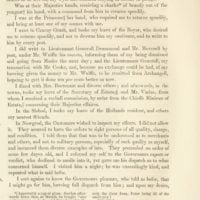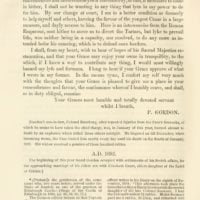
Related
![1686] DIARY OF PATRICK GORDON. 119 lages on the road, and on both sydes](https://cdn2.picryl.com/thumbnail/1699/12/31/1686-diary-of-patrick-gordon-119-lages-on-the-road-and-on-both-sydes-f65fc6-200.jpeg)
1686] DIARY OF PATRICK GORDON. 119 lages on the road, and on both sydes
![1690] DIARY OF PATRICK GORDON. 169 regiments in line three deep](https://cdn2.picryl.com/thumbnail/1699/12/31/1690-diary-of-patrick-gordon-169-regiments-in-line-three-deep-7f03ff-200.jpeg)
1690] DIARY OF PATRICK GORDON. 169 regiments in line three deep

114 DIARY OF PATRICK GORDON. [1686 Shrudeus krue, three miles from Riga
![1686] DIARY OF PATRICK GORDON. 155 Crossing the Black River](https://cdn2.picryl.com/thumbnail/1699/12/31/1686-diary-of-patrick-gordon-155-crossing-the-black-river-daa006-200.jpeg)
1686] DIARY OF PATRICK GORDON. 155 Crossing the Black River

140 DIARY OF PATRICK GORDON. [1686 Wee rode to Gingle Kirk

62 DIARY OF PATRICK GORDON. [1666 purpose to convoy

110 DIARY OF PATRICK GORDON. [1686 I gave up my petition
![1686] DIARY OF PATRICK GORDON. 125 stuiver. From thence to Workum](https://cdn2.picryl.com/thumbnail/1699/12/31/1686-diary-of-patrick-gordon-125-stuiver-from-thence-to-workum-0ef529-200.jpeg)
1686] DIARY OF PATRICK GORDON. 125 stuiver. From thence to Workum

174 DIARY OF PATRICK GORDON. [1692 be restored. As for Harie Gordon
116 DIARY OF PATRICK GORDON. [1686 a third, on the way to Konigsberg
Summary
Passages from the diary of General Patrick Gordon of Auchleuchries : A.D. 1635-A.D. 1699"
116 DIARY OF PATRICK GORDON. [1686
a third, on the way to Konigsberg, being wearying of tossing upon a
waggon. I payed here, for dyet, wine, and feeding the sojors, twelve
florens, includeing Yury Powlson. I gave to the maid fyfteen pence, and
bought ane amber crosse, a charke, and three bracelets, for four and a half
dollers.
This Memell is a very strong place, especially the castle, which is to be
fortifyed yet better, according to a draught which the Commendant did
show me, most of the materialls being already provided. The souldiers
have duly allowance of six florens a moneth, for two whereof they are pro-
vided of bread ; two ar given them to buy beer, kitchin meat, and extra-
ordinaries ; and two is preserved by their officers for furnishing them with
sliooes, stockings, shirts, and other necessaries. A captaine hath thirty two
dollers a month ; a liewtennant, eighteen ; and an ensignie, twelve.
Haveing hired a coach, at the rate of a reichs doller a day, I rode in it
to Scotland Syde, and, in the Jesuits Church, heard devotion. In the after-
noone, the Rector of the Jesuits Colledge gave me a visitt, to whom I de-
clared my resolution of takeing my son along with me ; for, perceiveing
that they had here infected him with Calvinisme, I was afrayed he should be
altogether subverted. I repayed the visitt to Mr. Browne and Mr. Forbes,
and consulted with the Doctor concerning the boy Daniell.
Being invited, I dined by Mr. James Browne, where, with many of our
countreymen, I was very kindly entertained. I did writt to my wyfe, son
in law, and Collonell Leviston, in Kyow ; to the Boyar, Kniaz Vasily
Vasilivits ;* Mr. Vinius ; to Lievetennant Collonell Kruger, in Memell ; and
Mr. Georg Gray, in Konigsberg ; the former in a coverto to Mr. Georg Fraser,
in Riga. I hired a shease, with three horses, to Stetin, for eighty florens.
Haveing been at devotion by the Jesuits in Scotland Syde, and taken
leave of them, I dined by Mr. Forbes, and was very well entertained
I made preparations to be gone, haveing gott medicines for Daniell, the
ifriends sending me wyne and provisions on the way in abundance. I went
and tooke my leave of Mr. Browne, Mr. Forbes, and others. I changed
here forty ducats for currant money. Money disbursed in Dantzick : For
two paire of shooes, 5 florens ; for a clock to my son, 9 dollers 2 florens ;
for dyet and wine, 10 dollers 2 florens 10 pence ; drink money to the
* [Golizyn ]
Gordon was brought up and remained a lifelong Roman Catholic, at a time when the Church was being persecuted in Scotland. At age of fifteen, he entered the Jesuit college at Braunsberg, East Prussia, then part of Poland. In 1661, after many years experiences as a soldier of fortune, he joined the Russian army under Tsar Aleksei I, and in 1665 was sent on a special mission to England. After his return, he distinguished himself in several wars against the Turks and Tatars in southern Russia. In recognition of his service he was promoted to major-general in 1678, was appointed to the high command at Kiev in 1679, and in 1683 was made lieutenant-general. In 1687 and 1689 he took part in expeditions against the Tatars in the Crimea, being made a full general. Later in 1689, a revolution broke out in Moscow, and with the troops under his command, Gordon virtually decided events in favor of Peter the Great against the Regent, Tsarevna Sophia Alekseyevna. Consequently, he was for the remainder of his life in high favor with the Tsar, who confided to him the command of his capital during his absence from Russia. In 1696, Gordon's design of a "moveable rampart" played a key role in helping the Russians take Azov. One of Gordon's convinced the Tsars to establish the first Roman Catholic church and school in Muscovy, of which he remained the main benefactor and headed the Catholic community in Russia until his death. For his services his second son James, brigadier of the Russian army, was created Count of the Holy Roman Empire in 1701. At the end of his life the Tsar, who had visited Gordon frequently during his illness, was with him when he died, and with his own hands closed his eyes. General Gordon left behind him a uniquely detailed diary of his life and times, written in English. This is preserved in manuscript in the Russian State Military Archive in Moscow. Passages from the Diary of General Patrick Gordon of Auchleuchries (1635–1699) was printed, under the editorship of Joseph Robertson, for the Spalding Club, at Aberdeen, Scotland, 1859.
